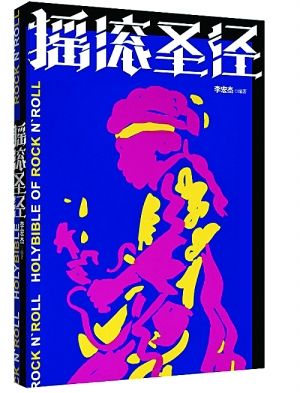Rock encyclopedia evolves as time goes by
- By Zhang Rui
 0 Comment(s)
0 Comment(s) Print
Print E-mail China.org.cn, August 14, 2013
E-mail China.org.cn, August 14, 2013
 |
|
Li Hongjie [File photo] |
It's been 10 years since music critic Li Hongjie compiled a rock music encyclopedia entitled the "Holy Bible of Rock 'N' Roll." The book released its updated 10th anniversary edition, adding a few more names to the already allusive list.
Li plays multiple roles in China's music landscape. As well as an acclaimed music critic, he was the editor in chief of the short-lived Rolling Stone China edition, works as a record producer and concert promoter. He was also the brain behind the launch of the Zhangbei Music Festival.
|
|
The new edition of the "rock 'n roll bible" also lists new artists emerging from the 2000's, including Adele, Coldplay and Kings of Leon. "More than 1,000 acts and 10,000 records have been added to the book," Li said, "The releases of those who were included in the previous editions have also been updated."
Li also abandoned the book's rating system. "We maintain the basic recommendation system, but don't rate the records this time in order to let readers listen independently and judge each record for themselves. We [always] hoped this book could be a useful tool to guide music fans; this intention remains. "
In recent years, China has seen various music festivals and TV contests emerging and rock music has gone mainstream among the nation's youth. After the many efforts of rock veterans like Cui Jian, Zhang Chu and Tang Dynasty, the music genre has finally entered its golden era in China.
"It's looking good," Li said, "All these reality singing competition shows are performing rock songs now. However, I do feel this 'prosperity' may just be superficial. What is the soul of rock 'n roll? Those who sing it do not [necessarily] have a deeper understanding of it. "
He added, "But when they sing, that is enough; it indicates rock's inner influence. More and more people now recognize the cultural innovation of rock 'n roll; especially those in the Chinese industry. Over the past 15 years, China's pop music has shown no innovation; now the pop music and entertainment industry invite rock musicians to become judges in their shows."
For Li, China's rock music should be more creative, "Why do Western musicians have so much to say through their music? They can write songs about the weather, [a loaf of] bread or a nation. Our musicians should try hard to catch up with the foreign rockers."
Li and Chinese rocker Zhang Chu attended a book signing in early August and talked about rock music's influence.
"Rock is a mainstream music category in the world," Zhang said, "But in China, it is always thought to be an underground culture."
He recalled his heyday in the 1990's, "At that time, everybody was poor. They did things they wanted to do. If somebody liked to do music, he would just do it; if somebody liked to write, he would just do it, without considering whether he would succeed or not," he said.
"If you want to know the [biggest] difference with today's musicians, I would say that we, the musicians of that [earlier] era, believed in what we believed and relied on. We had confidence in guiding our own spiritual lives, we were not lost."






